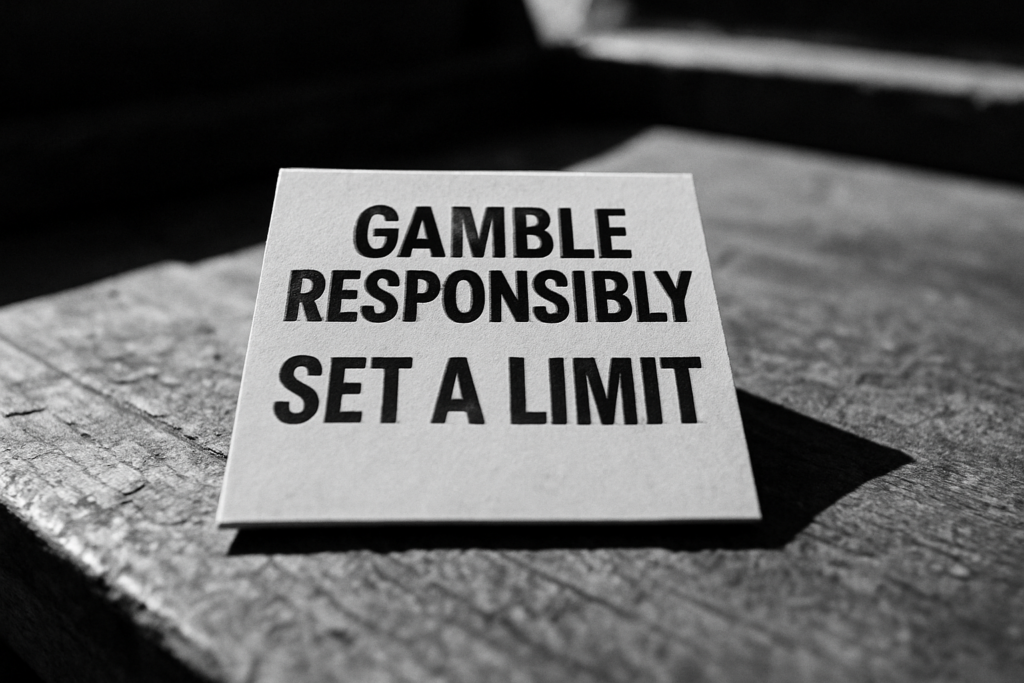Understanding Responsible Gambling
Responsible gambling ensures individuals enjoy gaming entertainment while managing the associated risks. It’s about making informed choices and maintaining control over gambling activities.
What Is Responsible Gambling?
Responsible gambling refers to engaging in gaming activities while prioritizing personal limits, financial control, and emotional well-being. It involves setting predefined budgets and timeframes to prevent overindulgence. Adopting responsible practices helps avoid gambling-related harm, such as financial distress or mental health issues.
Why Responsible Gambling Matters
Balancing enjoyment with responsibility minimizes negative impacts on personal and social levels. It protects financial stability, avoids compulsive behaviors, and fosters healthier gaming habits. Responsible gambling also reduces the risks of addiction, helping individuals maintain positive relationships and a stable lifestyle.
Essential Tips for Betting with Balance
Maintaining a balanced approach to gambling ensures enjoyment while minimizing risks. I focus on practical strategies to stay in control of my gaming activities.
Set a Budget and Stick to It
I allocate a specific amount of money for gambling that I can afford to lose. This ensures I don’t overspend or use funds meant for essential expenses like rent or groceries. Once I reach my limit, I stop betting, even if I feel tempted to continue.
Know the Risks and Odds
Before placing any bet, I familiarize myself with the:
- game’s rules
- probabilities
- payout structures
Understanding that the house always holds an advantage prevents unrealistic expectations. When I approach betting with this knowledge, I reduce the chance of making impulsive decisions.
Avoid Chasing Losses
I accept losses as a natural part of gambling and resist the urge to win back money by increasing my bets. Chasing losses often leads to emotional betting, which amplifies financial risks. Instead, I step away when the experience becomes frustrating or stressful.
Tools and Resources for Responsible Gambling

Staying in control is easier with the right tools and resources. Various programs and platforms focus on promoting responsible gambling habits to ensure safer gaming experiences.
Self-Exclusion Options
- Self-exclusion allows individuals to voluntarily restrict access to gambling platforms or venues.
- Many online and offline operators provide self-exclusion programs, such as GAMSTOP in the UK or local casino-based initiatives.
- These systems block users from participating in gambling activities for pre-defined periods, ranging from months to years.
- State-regulated sites often automatically respect such restrictions if legally mandated.
Budget Tracking Tools
Budget tracking tools enable users to manage their gambling expenses. Apps like GambleAware’s BetRegret App or spending trackers built into platforms help monitor deposits, withdrawals, and losses in real time. Setting daily, weekly, or monthly limits through platform controls prevents users from exceeding their financial boundaries. Utilizing these features improves accountability and reduces the risks of impulsive spending.
Support Services for Gambling Problems
Various organizations provide confidential support for gambling-related issues. Services like the National Problem Gambling Helpline in the US (1-800-522-4700) or Gamblers Anonymous meetings offer guidance, counseling, and peer support. Additionally, platforms like BeGambleAware and Gambling Therapy provide online tools, self-help modules, and professional consultations for emotional and psychological support. These resources aim to address the underlying causes of gambling behaviors and foster recovery.
Creating Healthy Gambling Habits
Maintaining healthy gambling habits enhances enjoyment while reducing risks. By balancing gambling with other activities and recognizing early signs of problem gambling, individuals can ensure responsible gaming.
Balancing Gambling with Other Activities
Diversifying recreational time prevents excessive focus on gambling. Engaging in hobbies like reading, sports, or creative arts adds variety and reduces dependency on gaming. Building social connections helps maintain emotional balance and provides alternative outlets for entertainment.
Prioritizing time management ensures gambling doesn’t overshadow responsibilities. For example, allocating specific hours for activities like work, family interactions, and exercise avoids overindulgence. Scheduling routine breaks during gambling sessions also prevents mental fatigue.
Recognizing the Signs of Problem Gambling
Acknowledging behavioral changes supports early intervention. Warning signs include spending more money or time than planned and neglecting responsibilities. Mood swings, irritability, and secrecy about gambling activities often indicate deeper issues.
Tracking finances highlights potential problems. For instance, difficulty covering personal expenses or borrowing to fund gambling suggests harmful patterns. If gambling persists despite negative consequences, seeking assistance becomes essential.



 Michaels Vincentuza – Founder & Chief Editor
Michaels Vincentuza is the driving force behind Gamble Wise Roll, a platform committed to delivering insightful and responsible coverage of the gambling industry. With a deep passion for gaming and years of experience in the field, Michaels founded the site to bridge the gap between industry professionals and everyday players, offering news, expert analysis, and ethical guidance. His expertise spans across various aspects of gambling, from traditional casino strategies to skill-based betting and the future of gaming innovations. Under his leadership, Gamble Wise Roll has become a trusted source for those seeking balanced, well-researched perspectives on the industry’s latest developments. Michaels remains dedicated to promoting responsible gambling while exploring the evolving intersection between gaming, technology, and entertainment.
Michaels Vincentuza – Founder & Chief Editor
Michaels Vincentuza is the driving force behind Gamble Wise Roll, a platform committed to delivering insightful and responsible coverage of the gambling industry. With a deep passion for gaming and years of experience in the field, Michaels founded the site to bridge the gap between industry professionals and everyday players, offering news, expert analysis, and ethical guidance. His expertise spans across various aspects of gambling, from traditional casino strategies to skill-based betting and the future of gaming innovations. Under his leadership, Gamble Wise Roll has become a trusted source for those seeking balanced, well-researched perspectives on the industry’s latest developments. Michaels remains dedicated to promoting responsible gambling while exploring the evolving intersection between gaming, technology, and entertainment.
